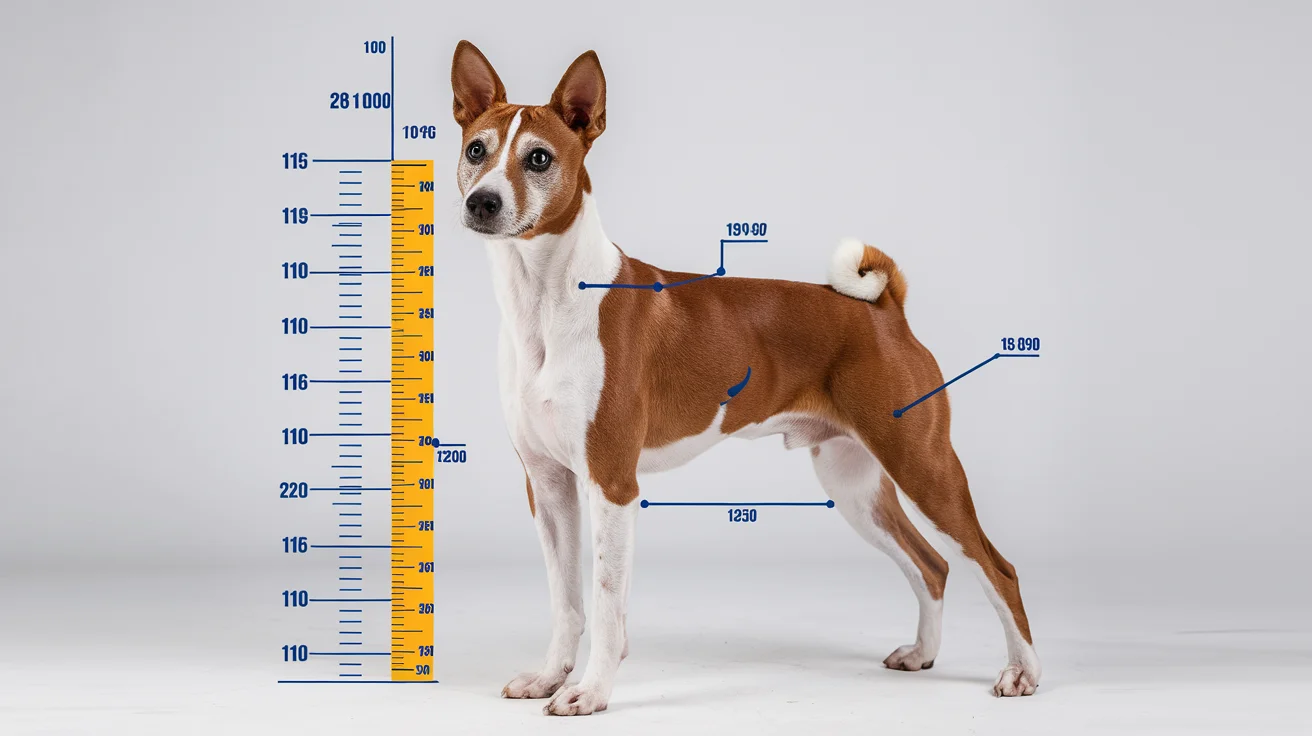Understanding your Basenji’s growth is crucial for ensuring a happy, healthy life for your furry friend.
This unique breed, often known as the “barkless dog,” has specific growth milestones that owners should monitor closely.
In this guide, we will explore the Basenji growth chart, covering each stage from puppyhood to adulthood, the factors that influence growth, and tips for optimal care.
Basenji Growth Chart Overview

A Basenji growth chart provides a visual representation of the expected weight and height milestones throughout a Basenji’s development. By tracking these measurements, owners can ensure their dogs are growing appropriately and receiving the necessary care.
Key Milestones in Basenji Development
| Age Range | Weight (lbs) | Height (inches) |
| 0-4 Weeks | 1-3 | 8-10 |
| 1-2 Months | 4-7 | 10-12 |
| 2-3 Months | 7-12 | 12-14 |
| 3-6 Months | 10-20 | 14-16 |
| 6-12 Months | 20-25 | 16-17 |
Understanding these milestones helps you gauge your Basenji’s development and spot any potential health issues early on.
Growth Stages
0-4 Weeks
During the first four weeks of life, Basenji puppies undergo rapid development.
- Birth Weight: At birth, a Basenji puppy typically weighs between 1 to 3 pounds.
- Early Development: In this period, puppies rely solely on their mother’s milk for nutrition, leading to significant weight gain.
- Socialization: Puppies begin to engage with their littermates, laying the foundation for social behavior.
1-2 Months
By the time Basenjis reach 1 to 2 months, they are starting to transition to solid food.
- Weight: Expect puppies to weigh between 4 to 7 pounds.
- Vaccinations: This age is crucial for vaccinations; puppies should receive their first vaccinations to protect them against diseases.
- Social Skills: Interactions with humans become more frequent, enhancing their socialization skills.
2-3 Months
At 2 to 3 months, Basenjis experience rapid growth.
- Weight: They typically weigh between 7 to 12 pounds.
- Nutrition: Introduce high-quality puppy food to support their growing needs. Ensure the diet is rich in protein and fats for optimal development.
- Training: Start basic training during this stage, as Basenjis are intelligent and can learn quickly.
3-6 Months
From 3 to 6 months, Basenjis continue to grow physically and mentally.
- Weight: They can weigh anywhere from 10 to 20 pounds.
- Dietary Changes: Adjust feeding amounts based on weight and activity level. Aim for 3 to 4 meals per day to maintain energy levels.
- Behavioral Development: This is a critical time for establishing routines and training to curb any unwanted behaviors.
6-12 Months
As they approach 6 to 12 months, Basenjis near their full size.
- Weight: Expect them to weigh between 20 to 25 pounds.
- Height: Their height typically ranges from 16 to 17 inches.
- Continued Training: Focus on reinforcing training commands and socializing with other dogs to prevent behavioral issues later on.
Free Resources for Basenji Owners
FREE eBook for Breed Atlas Club Members
To enhance your understanding of Basenjis, the Breed Atlas Club offers a valuable resource: a FREE eBook designed for members.
- Content Overview: The eBook includes tips on training, nutrition, health care, and breed history.
- Access: Membership provides access to this resource, helping you become a more informed Basenji owner.
Factors That Affect Growth
Understanding the factors that influence growth can help you support your Basenji’s development effectively.
Genetics
Genetic factors play a significant role in your Basenji’s growth. The lineage can determine size, coat quality, and even temperament. Puppies from larger parents may grow to be larger themselves.
Nutrition
Proper nutrition is vital for healthy growth. A well-balanced diet should include:
- Proteins: Essential for muscle development.
- Fats: Necessary for energy and healthy skin.
- Vitamins and Minerals: Support overall health and immunity.
Exercise
Physical activity influences muscle growth and overall health. Basenjis are energetic dogs, so daily exercise is crucial. Aim for at least 30 minutes of activity daily.
Health Care
Regular vet check-ups can catch growth-related issues early. Routine vaccinations, deworming, and health screenings ensure your puppy develops healthily.
Common Growth Concerns

As a Basenji owner, being aware of common growth concerns is crucial for maintaining your dog’s health.
Signs of Underweight or Overweight
Monitor your Basenji’s weight regularly. Signs to watch for include:
- Underweight: Visible ribs, lack of energy, or poor coat quality.
- Overweight: Difficulty in movement, excess fat around the waist, or breathing issues.
Growth Plate Issues
Basenjis can experience growth plate problems, especially if they undergo rapid growth. Consult your vet if you notice any limping or reluctance to exercise.
Importance of Regular Monitoring
Regular monitoring of weight and growth can help catch potential issues early. Keeping a journal or using apps to track your Basenji’s growth can be beneficial.
Tips for Owners
To support your Basenji’s growth and development, consider the following tips:
Recommended Feeding Schedules
- 0-2 Months: Nursing or puppy milk replacer.
- 2-4 Months: 4 meals per day.
- 4-6 Months: 3 meals per day.
- 6-12 Months: Transition to 2 meals per day.
Training Advice
Basenjis respond well to positive reinforcement. Use treats and praise to encourage good behavior. Consistency is key, so establish clear commands and routines.
Socialization Strategies
Early socialization is crucial for a well-adjusted Basenji. Introduce your puppy to different people, environments, and other dogs to promote adaptability.
Conclusion
Tracking your Basenji’s growth is essential for ensuring a healthy and happy life. By understanding the milestones and factors that affect their development, you can provide the best care possible.
Additional Resources
- Basenji Forums: Join communities to connect with other owners and share experiences.
- Books on Basenji Care: Consider reading more specialized literature for in-depth knowledge.
This guide aims to equip you with the necessary knowledge to support your Basenji through every stage of growth, ensuring they thrive in a loving environment.












